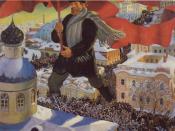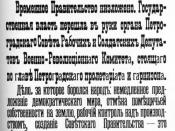The October revolution of 1917, led by the Bolshevik Soviets was the first communist revolution that successfully overthrew a government. This revolution was only possible due to the weaknesses of the provisional government.
Initially the provisional government was seen as a symbol of change, a symbol of possibility regarding freedom, land and stability. Support for the provisional government did not last long. Promises such as distribution of land and distribution of income were quickly swept under the carpet. Many would argue that it was simply the 12 (self elected) aristocrats that caused the provisional government to quickly breake their promises to the people. This was due to the fact that the aristocrats under the Czar has controlled huge area's of land, and did not want to lose it simply because the peasants thought they deserved land. Only a couple of months after the provisional government had been created (beginning of 1917), people had become weary of what the provisional governments main aims were.
Not only was it what the provisional government did not promise that caused the revolution, but also the integration of the government into the average working class helped agitate an October revolution. As stated before, unlike the Bolsheviks the provisional government was led by 12 elite aristocrats (Czar loyalists). This posed a huge problem as the provisional government did not ensure that their decisions were based on what the vast majority of the populous wanted, but what the few who controlled it wanted. Think of the reason why Prince Lvov stepped aside. The Bolsheviks on the other hand, were working class people, and even though they had a very little minority of supporters they had a much clearer idea to how the people viewed the government and what eventual change would be necessary, in order...


